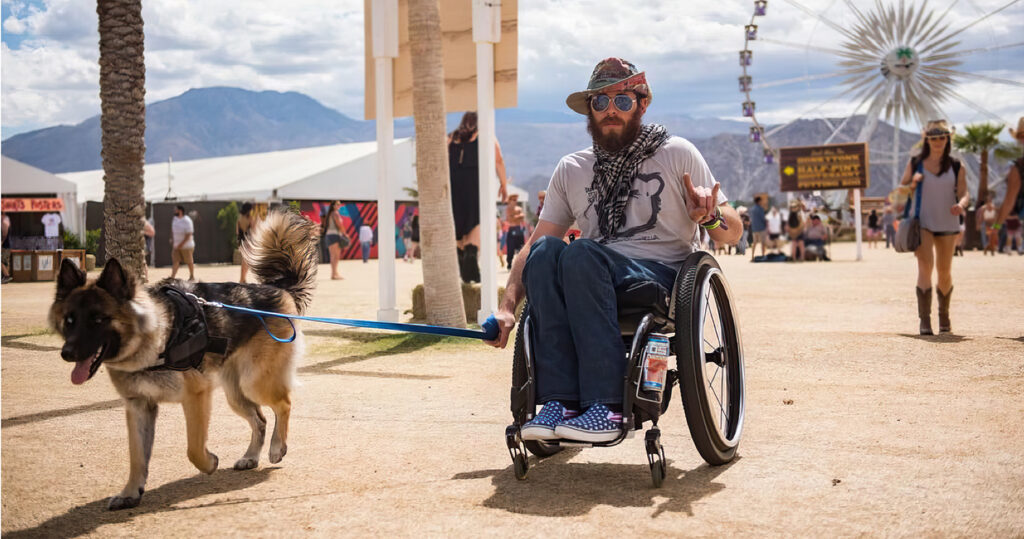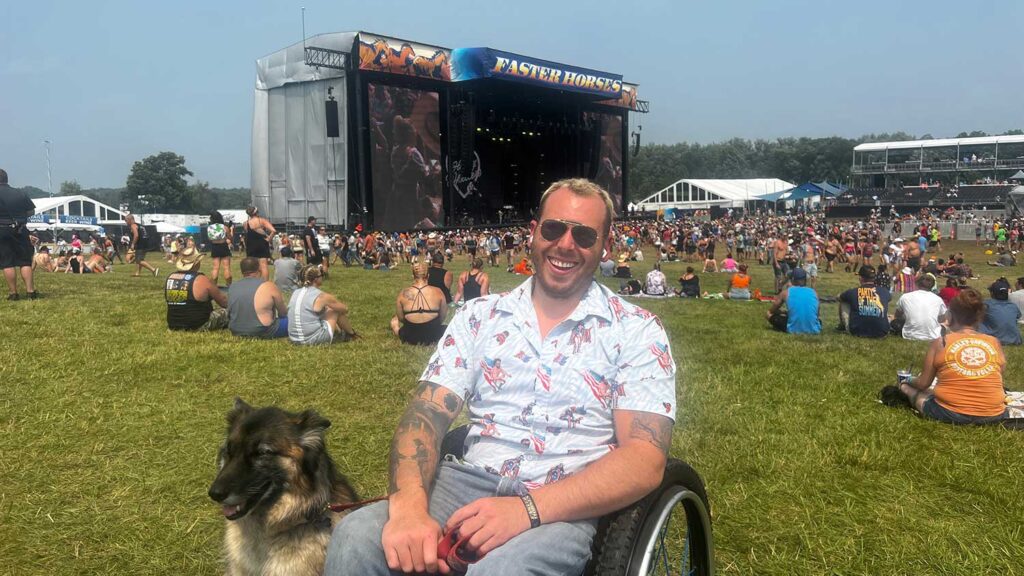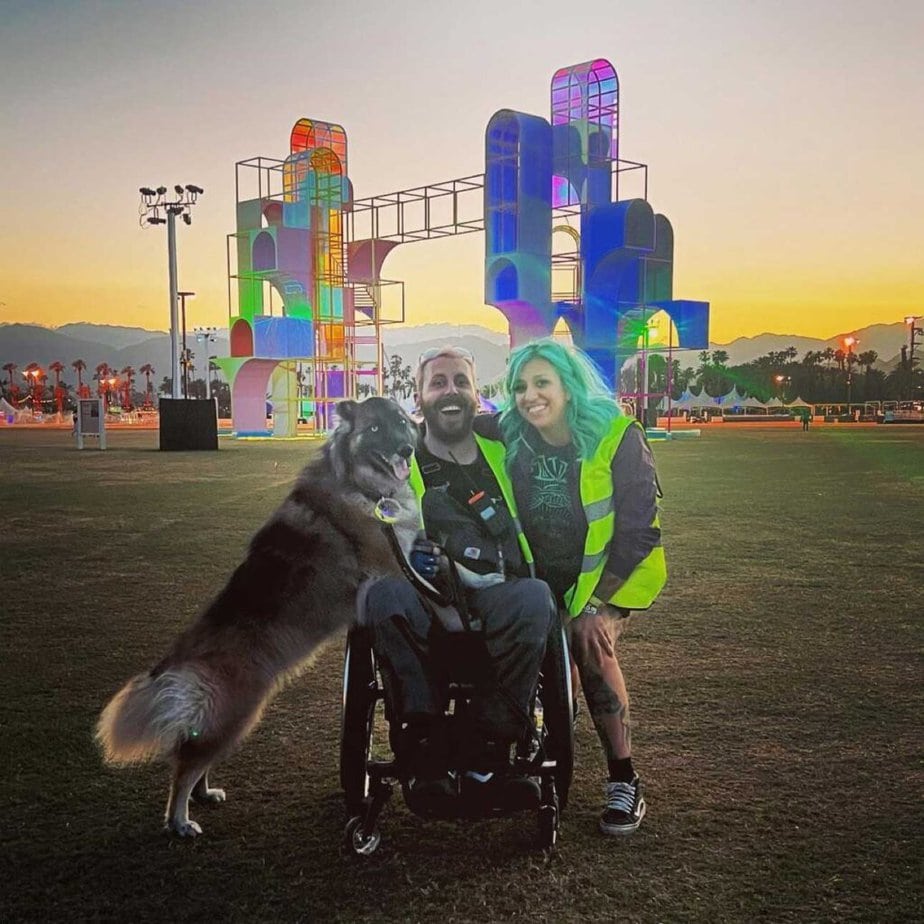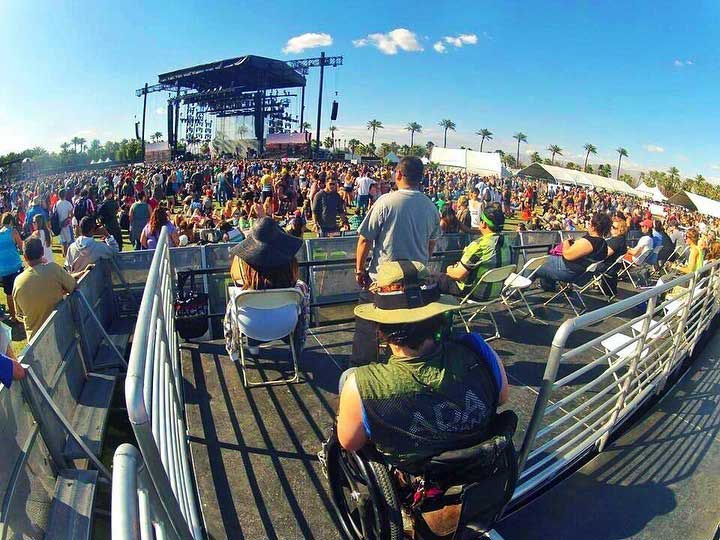
The two-weekend, six-day Coachella Valley Music and Arts Festival, in Indio, California, is one of the most famous and well-attended annual music events in the U.S. With over 100,000 attendees packed into a sprawling venue and 100-degree desert temperatures, it’s also a potential nightmare for accessibility.
Austin Whitney, the festival’s ADA compliance coordinator, is responsible for making certain that nightmare never materializes. As the president and founder of Ten Fifty Entertainment, the leading provider of accessibility and guest services for large events, Whitney works behind the scenes to ensure that other disabled people can enjoy whatever shows they choose to attend.

For Coachella, that means organizing a fleet of accessible golf carts for shuttling attendees; overseeing ADA viewing areas; coordinating accessibility service hubs around the venue; providing sign language, captioning and digital accessibility services; ensuring there are food options for people with allergies; and providing people who experience overstimulation a place to decompress. That’s not to mention countless other smaller and more mundane responsibilities.
Providing an excellent accessible experience is personal for Whitney. He attended his first Coachella in 2008, only nine months after sustaining a T12-L1 injury in a car crash. Whitney was still getting used to life in a chair, with bouts of depression and doubts about what he could do, when a college friend invited him to go. He almost said no. “I imagined Woodstock,” he says. “I imagined these huge crowds, and I’m like, ‘I’m not gonna be able to see the main stage. I’m not going to be able to use the restroom. No, that’s not for me.’”
But with nothing to do during spring break, and feeling a need to lift his own spirits, Whitney answered yes. He and his friend navigated the crowds and a good amount of inaccessibility — and had an absolute blast. He saw some of his favorite artists, made new friends, got energized by the crowds, and just felt free. “If I look back on that time,” he says, “the first year after my car accident, that was kind of the breakthrough moment of that time period, where it’s like, ‘OK, things might go on. I might be able to be happy again.’”
An Education in Disability
That positive experience played a key role in starting Whitney on a career path that led him to founding Ten Fifty Entertainment. In the spring after attending Coachella, he transferred to the University of California, Berkeley. He always considered the hillside campus his dream school because of its track record for developing leaders. He soon discovered it was also the birthplace of the disability rights movement and home to an active disability community.
A class on the history of the disability rights movement helped Whitney understand how activists make the world a more accessible place. “If I’d been born 40 years earlier, my life would be totally different,” he says. “People were experiencing widespread inaccessibility back then, and they said, ‘We demand change.’ That stuck with me.”

His passion for live music grew as he attended festivals while an undergrad, but the more he attended, the more he saw how little thought was given to accessibility. “I had shows where people had to put me on their backs and carry me down stairs,” he says. “I had shows where I couldn’t see a stage and couldn’t use the restroom.”
In his senior year, he got an internship with one of the Bay Area’s leading event promoters. Being behind the scenes gave him a sense of what was needed to significantly improve accessibility. “When I first got started [in the entertainment industry] in 2011, I said, ‘OK, I want to spend some time working on this problem because everyone should be able to enjoy these things,’” he says.
To develop the skills to help realize his goal, Whitney enrolled in law school at UC Berkeley in 2012. The following year, he got a chance to design his first ADA compliance operation at a Southern California festival called Lightning in a Bottle. He told the producers, “I think I can use my experience, and if you give me a tiny amount of money and a bunch of volunteer passes to give my friends, I can make your event more accessible.” The producers agreed, and the show was a success, with noticeably improved accessibility.
Whitney didn’t know it, but his name was making the rounds in the festival industry. Within a few months, he got a call from an event production company doing multiple shows a year, and he worked with them to help make their events more accessible. The realization he could work on multiple festivals at the same time motivated him to take the next step.
During the summer of his second year in law school, Whitney approached his college roommate, Oren Shani, with the idea of starting Ten Fifty Entertainment. Named after their Berkeley, California, address number, the project began as a nonprofit, but quickly split into the for-profit Ten Fifty Entertainment, providing accessibility services to event producers, and the nonprofit Accessible Festivals, focusing on getting people with disabilities to festivals.An Industry Leader
Last year, Ten Fifty Entertainment provided accessibility services to 99 live events, including 70 of the 100 highest-grossing live music festivals in the country. Those events took place in 22 states, and Ten Fifty is branching out with international events in Mexico, Costa Rica, Canada and London.
They work primarily on music festivals but also manage accessibility at sporting events, conventions and municipal events. Ten Fifty’s current clients include Coachella, Bonnaroo Music & Arts Festival, Rolling Loud, EDC, Formula 1 Las Vegas Grand Prix, the PGA Championship, Star Wars Celebration, and several of the nation’s largest temporary events. Many occur in venues that rely on temporary infrastructure, including stages, viewing platforms, tents, concessions and restrooms, and regulations affecting access can vary by state. Because of that, Whitney and his team had to develop guidelines from scratch and refine them over the years. “One thing that attracted me to this space is that this is all temporary,” he says, “which means if I work a show this year and I don’t like a part of it, I have a blank canvas in 2024 and can start over.” This results in ever-improving accessibility for attendees with disabilities.
While Ten Fifty Entertainment handles the logistics of staging events, Accessible Festivals works to address the more personal and cultural aspects of event accessibility. Whitney now serves as board chair, working with Executive Director Amy Pinder to grow the organization.
“I would say Accessible Festivals is like a big umbrella entity,” says Pinder, who is also a speech and language therapist. “We have a lot of programs and projects in place that all support the idea of advocating for more accessible experiences in the music festival space.” Whitney and the AF team give accessibility trainings to industry staff and have a consulting program for more in-depth projects.
Accessible Festivals hosts the Inclusion Festival, an annual three-day event in Pennsylvania with live music, immersive experiences, and both educational and recreational workshops. Pinder says the “sensory-friendly” event hosted about 1,000 attendees in the summer before the pandemic. “We like to see how we can go beyond ADA requirements,” she says, citing technologies like vibrating backpacks so deaf concertgoers can feel the beat of music. These SUBPACs are available now at some of the larger festivals that Ten Fifty Entertainment supports.

Sharing the Experience
The Accessible Festivals project closest to Whitney’s heart is the Dan Grover Memorial Ticket Grant Program, named after a music-industry friend of Whitney’s who had muscular dystrophy and passed away in 2022. As part of this program, Accessible Festivals gives away festival tickets to people who haven’t attended one since they became disabled. “I want to give something for people to look forward to, that would help them out at a time where they could really use some help,” Whitney says, harkening back to his transformative experience at Coachella. “So, we built out this program, and I got most of the industry to participate in it, which is the cool part.”
Kimmi Churchill attended a couple of music festivals a year before her T4 spinal cord injury in a car accident in 2020. “I didn’t really think that I would have any more fun, you know, in a wheelchair,” she says. “That was, until I saw Accessible Festivals on Instagram. And I’m like, ‘They look like they are having fun, so it is possible to still be accommodated at a festival like that, or at a rave.’”
Churchill signed up for the Dan Grover Ticket Program online and got a ticket for HARD Summer, a Los Angeles-based music festival. She ended up meeting several people and making “new wheelie friends” at the ADA platforms. “I just got more and more confident [from day 1 to day 3], came out of my shell more and all that,” she says. “The experience got better and better as the weekend progressed.”
She says going to HARD Summer “has been really great for my journey and recovery.” It also rekindled her love of live music: After getting home, she bought tickets to the Jackpot NYE rave in Las Vegas and is back on track to attend two events a year.
Churchill is one of more than 20,000 disabled guests whom Ten Fifty Entertainment and Accessible Festivals work with every year. Whitney and staff say they get plenty of feedback in person and online, and they vow to continue improving. “I love my job because I get to see people enjoying the thing they like to do,” he says. “It doesn’t matter to me if it’s a country show, if it’s a motor vehicle race or a show with music that I like, a rock show. I just like helping people enjoy whatever they are into.”
Whitney wants the industry to keep evolving with widespread accessibility and more cutting-edge services like those pioneered at Inclusion Festival. “I would definitely encourage people to go to festivals,” he says, “because it’s just gotten so much better and it will keep getting better.”
If you’re interested in applying for free tickets through the Dan Grover Memorial Ticket Grant Program, visit accessiblefestivals.com.
Support New MobilityWait! Before you wander off to other parts of the internet, please consider supporting New Mobility. For more than three decades, New Mobility has published groundbreaking content for active wheelchair users. We share practical advice from wheelchair users across the country, review life-changing technology and demand equity in healthcare, travel and all facets of life. But none of this is cheap, easy or profitable. Your support helps us give wheelchair users the resources to build a fulfilling life. |


Austin is my hero and my nephew . He has helped countless people with his can do attitude and inspiration . Walking to accept his degree at Berkeley in the exoskeleton , camping in national parks with only his trusty companion, Ophelia, jet skiing , paragliding,…and the list goes on and on. He is truly an old soul in this new age. One of the most genuine people I have met in my 77 years.
Susan Whitney Johnson
Way to go, Austin. So glad you’ve found something meaningful that you love. All my best to Jim and Lil for doing the amazing parenting job that has helped shape who you’ve become.
It’s about time! I miss going to concerts. I would like to get involved.
Is there accessibility for the visually impaired?
Have you been in contact with anyone in Louisiana about festivals and events in the Lafayette Parish area? We have Festival International de Louisiane and Festivals Acadiens et Créoles. Neither are very accessible.
I learned of Austin at 2023 Peachfest in Scranton PA. I was very surprised by the amazing group supporting the festival goers with disabilities including me! I have a spinal cord injury from a car accident but never changed how I feel about live music. The TenFifty team changed my how I feel about taking the first step and making the effort to participate. Thank you.